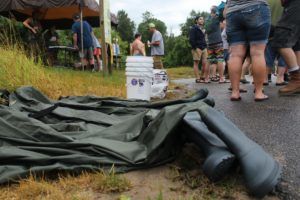Manistee River Clean Up
The Manistee River is known for its excellent fishing( such as Steelhead, Coho Salmon and Brown Trout) and beautiful scenery. It is apart of the Manistee watershed which is one of the biggest watersheds in the lower peninsula of Michigan draining a total of over 1700 square miles of land before entering Lake Michigan.
Watersheds are vital to the environment because all of this surface water runs off within the watershed and drains to streams, which leads to rivers which could potentially lead to the Great Lakes. Everything upstream eventually ends up downstream and it is essential to think about these downstream impacts when thinking of the big picture.
That’s why on Saturday, July 20th MUCC teamed up with the Huron-Manistee National Forest and Steelhead Manifesto to host the fifth annual Big Manistee River Clean-Up in the Huron-Manistee Forest at the High Bridge Boat Launch. Over 40 volunteers showed up to give back to their local community and watershed. About 200 pounds of trash was collected by these hard-working volunteers. This included plastic water bottles, pop cans, metal ladders, fishing rods and much more.

Even though the event ended early due to bad weather everyone’s positive mental attitude was high and there were smiles all around.
MUCC is working hard to unite citizens to conserve, protect, and enhance Michigan’s natural resources and outdoor heritage. We want to encourage the public to connect to our natural resources through active reactions. More events will be coming to a watershed near you soon!
The post Manistee River Clean Up appeared first on Michigan United Conservation Clubs.
Recent Posts



